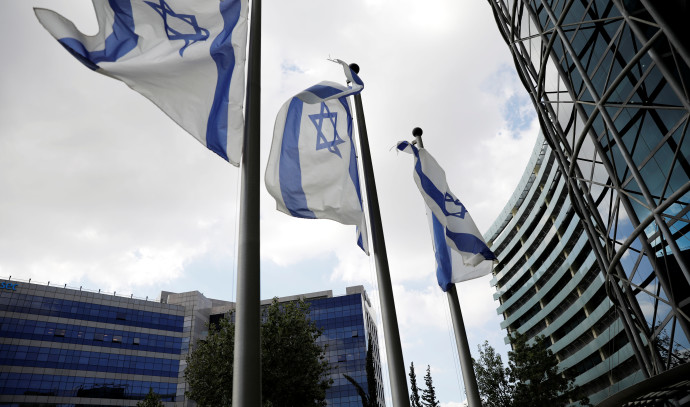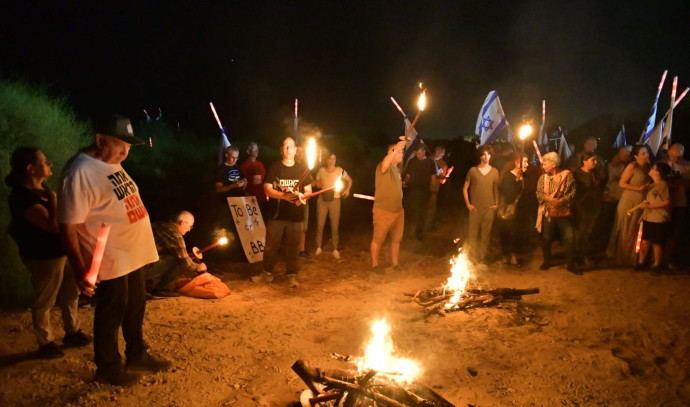ARTICLE AD BOX
“Abrahamic peace is the only path forward” say Syrian delegates in exile during first and unique encounter with the Israeli public
By OHAD MERLIN DECEMBER 12, 2024 13:23 Screenshots from the Zoom call. Left: Syrian representative Jamal Sabbagh. Right: Israeli MK Ohad Tal
(photo credit: screenshot)
Screenshots from the Zoom call. Left: Syrian representative Jamal Sabbagh. Right: Israeli MK Ohad Tal
(photo credit: screenshot)
In an unprecedented encounter, leaders of a group dubbed the “Syrian Government in Exile” (SGE) engaged in a remarkable dialogue session with the Israeli public, offering a vision of unprecedented cooperation and mutual understanding between Syria and Israel.
The online meeting was organized by Tom Wegner, founder of the Middle East Center, a platform fostering dialogue, collaboration, and understanding between diverse communities in the Middle East.
Speakers included representatives from the SGE, as well as Israeli MK and member of the Knesset’s Foreign Affairs and Security Committee, Ohad Tal.
‘More Hebrews than the Hebrews’
At the heart of the discussion was Jamal Sabbagh, the head of the Syrian Government in Exile, who praised the IDF and the Free Syrian Army for their efforts to remove the Iranian influence in the region, which he dubbed “terrorist militias.”
Sabbagh was unequivocal in his gratitude, specifically acknowledging Israeli leadership’s "wise policy" and efforts to bring about what he termed the "Abrahamic peace" in the region.
The Syrian leader expressed a profound desire to move beyond historical animosities, emphasizing their vision of an EU-like system across the Middle East, where each region and community would have its own autonomy, and stressing that their forum aspires to represent all Syrian people, from Kurds to and moderate Sunni fighters who fought against ISIS.
Amal Sharkasi, the SGE’s foreign relations charge d’affaires, highlighted Syria's historically diverse and tolerant society, recalling a time when religious coexistence was the norm.
According to Sharkasi, before the Assad era, Syria espoused a model of interfaith harmony, including examples such as Christian Prime Minister Fares Al-Khouri and Jewish doctors in Aleppo who treated patients from all faiths free of charge.
Dr. Ziad Karim, the communication director of the SGE, stressed that these are critical moments in human history, emphasizing the shared destiny and mutual responsibility of all actors.
"We are not living on an isolated island but in a shared fate," Karim said. He advocated for a public discourse focused on construction rather than destruction, with a particular emphasis on protecting future generations from the "swamp of extremism." Karim poignantly continued: "The Abrahamic peace is a roadmap to mutual understanding and a future where wisdom embraces humanity above all else."
Stay updated with the latest news!
Subscribe to The Jerusalem Post Newsletter
From the Israeli side, MK Ohad Tal is a member of the Knesset’s Foreign Affairs and Security Committee.
Tal highlighted the significant transformation of Israel’s status in the past year, describing it as moving from a status of being an existential threat – to the ongoing disintegration of radical forces.
He emphasized the potential for collaborative efforts against common challenges, specifically mentioning the Iranian Axis and radical Sunni movements.
The conversation also featured representatives from Iraq, such as Abou Musa Al-Iraqi, a tribal delegate, as well as a local anonymous peace activist who operates social media accounts dubbed the “virtual embassy of Iraq to Israel.”
Both added another dimension to the dialogue, discussing the continued presence of Iranian militias in Iraq and calling for actions to facilitate peace.
Perhaps most striking was the explicit rejection of historical antagonisms. The Syrian Government in Exile repeatedly extended a hand of friendship, using language that emphasized kinship and shared heritage.
They described themselves as "more Hebrew than the children of Israel" and called for a return to mutual respect and coexistence, also bringing up the holocaust as a dark moment in human history that must be taught to all people in the region and learned from.
‘Peace through strength’
The Syrian Government in Exile was formed in late 2019 following what SGE described as a “political deadlock among opposition forces.” Their primary objective was to bring what they deemed the “authentic Syrian voice” to the international stage, with the struggle against the Iranian influence in the region as their primary concern.
The scope and impact of the exiled activists appear pale in comparison to those of the militant groups on the ground, yet they presented themselves not as a traditional political entity but as representatives of a new vision – one that “prioritizes human dignity, mutual understanding, and peaceful coexistence.”
During the discussion, both sides acknowledged the complex challenges ahead, especially the involvement of radical forces, whether Iranian-backed militias or extremist Sunni movements, which would not be easily overcome.
Despite this, conversations consistently returned to the concept of "Abrahamic peace,” a vision based on the Abraham Accords of 2020. Both the SGE delegates and the Israeli speakers portrayed this approach not just as a diplomatic strategy but as a moral imperative for human progress.
Following the session, MK Ohad Tal told The Jerusalem Post: “The meeting we held tonight with representatives of the Syrian government in exile and Muslim leaders from Iraq is a historic meeting, mainly because after a series of secret meetings I have held with them in recent months, this meeting is already a public meeting, open to the public.
“The past year has accelerated deep processes in the Middle East. The Israeli victories and the disintegration of the Iranian-Shiite axis are allowing more and more tribes, peoples, and countries in the Middle East to reveal their desire to get closer to Israel, the understanding that has developed in them that Israel is not the problem as they thought for many years - but rather the solution.
“Alongside the great challenges that still await us, both from Iran and its proxies and from the Sunni Islamist militias, unprecedented historical opportunities are also developing to create new collaborations that will help build a better future that, this time, will truly fulfill the dream of peace, stability, and prosperity. From the strength of Israel, a peace that is based on true mutual respect and true acceptance of our common existence here.”

 2 weeks ago
56
2 weeks ago
56








 English (US) ·
English (US) ·